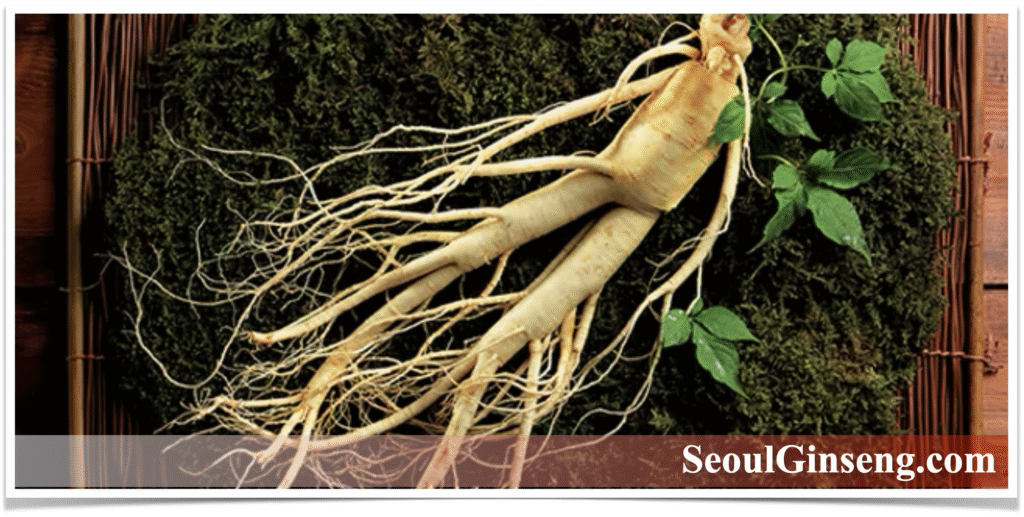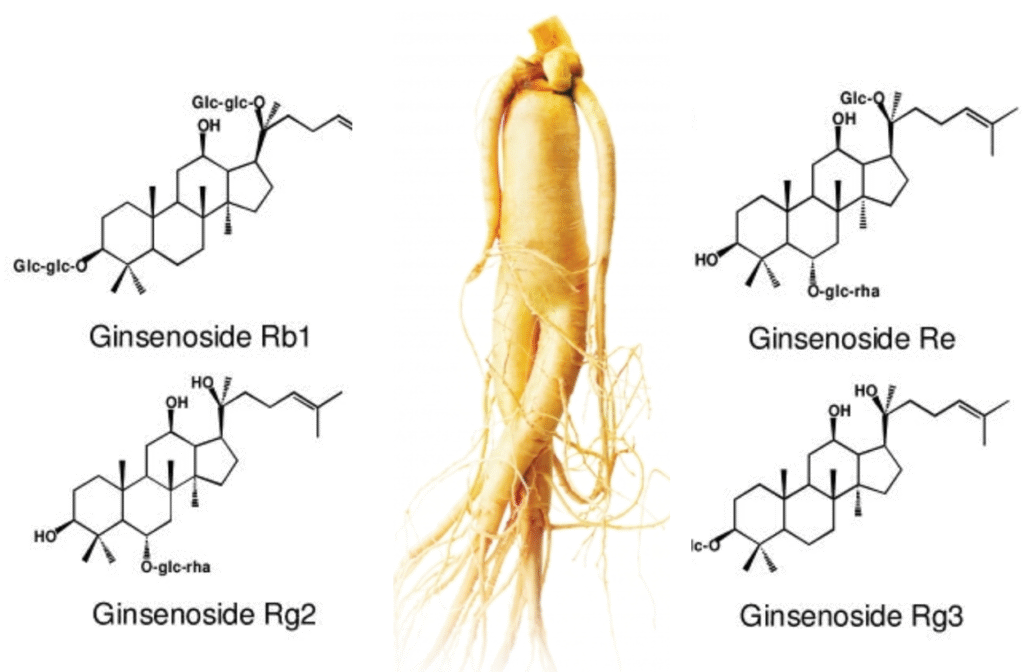Health Benefits of Korean Ginseng Through History

Ancient Origins and Traditional Use
For more than 2,000 years, Korean ginseng (Panax ginseng C.A. Meyer) has been revered across East Asia as one of the most powerful and precious medicinal plants. In Korea, China, and neighboring regions, it was often called the “elixir of life.” Its unique root structure and rarity in the wild made it a symbol of wealth, vitality, and longevity.
Classical medical texts, such as Dongui Bogam (1613) in Korea, describe ginseng as a restorative herb that replenishes qi (vital energy) and strengthens overall resilience. It was frequently reserved for kings, scholars, and warriors, and even used as a diplomatic gift between kingdoms.
Traditionally, Korean ginseng was believed to:
- Boost stamina and physical endurance for soldiers and laborers.
- Enhance mental clarity and memory for scholars and officials.
- Aid in recovery from prolonged illness, weakness, and fatigue.
- Promote longevity and vitality, making it a highly sought-after tonic in royal courts.
Modern Scientific Insights and Verified Health Benefits
Today, modern research provides scientific validation for many of these traditional uses. Numerous peer-reviewed studies and clinical trials confirm the health benefits of Korean ginseng’s bioactive compounds, particularly ginsenosides.
1. Energy and Fatigue Reduction
- Clinical studies show Korean ginseng helps reduce fatigue and improve stamina by enhancing mitochondrial function and energy metabolism.
- Athletes often use it as a natural performance enhancer, while patients recovering from illness find it beneficial for faster recuperation.
2. Cognitive and Mental Health
- Research indicates improvements in memory, concentration, and mood.
- Korean ginseng may regulate neurotransmitters like dopamine and serotonin, supporting mental clarity and stress resilience.
3. Immune System Support
- Ginseng polysaccharides and ginsenosides stimulate immune cells (NK cells, macrophages), helping the body fight infections.
- Some studies suggest regular use reduces the frequency and duration of colds and flu.
4. Heart and Metabolic Health
- Evidence suggests Korean ginseng may improve circulation, reduce oxidative stress, and support healthy cholesterol levels.
- It may also improve insulin sensitivity, making it beneficial for individuals at risk of metabolic syndrome.
5. Anti-Aging and Longevity
- Rich in antioxidants, ginseng helps reduce cellular damage and inflammation linked to aging.
- This aligns with its historic reputation as an “elixir of life.”
6. Adaptogenic Properties
- Korean ginseng is classified as an adaptogen, meaning it helps the body maintain balance and resilience against physical, emotional, and environmental stress.
Why Korean Ginseng Stands Out
While other ginseng varieties exist (American ginseng, Siberian ginseng), Korean ginseng is unique due to:
- High concentration of ginsenosides compared to other species.
- Cultivation methods rooted in centuries-old Korean agricultural tradition.
- Global recognition by WHO and scientific journals as a leading herbal adaptogen.
Practical Considerations and Responsible Use
- Forms available: red ginseng extract, capsules, powders, teas, and tonics.
- Safety: Generally well-tolerated when consumed in moderate amounts, but individuals with hypertension, insomnia, or those on anticoagulant medications should consult healthcare providers before use.
- Not a cure: Korean ginseng supports wellness but should not replace medical treatment for chronic diseases.
Conclusion
From ancient dynasties to modern clinical trials, Korean ginseng has remained a trusted source of vitality, resilience, and health. Its benefits—rooted in history and reinforced by science—make it a unique bridge between traditional wisdom and modern medicine.
Whether consumed as a daily tonic, a natural performance enhancer, or an immune system ally, Korean ginseng continues to live up to its reputation as the “root of life.”

What Are Ginsenosides?
The Core Bioactive Compounds in Korean Ginseng
Ginsenosides are the primary active compounds found in Panax ginseng (Korean ginseng). They belong to a class of triterpene saponins, natural plant chemicals known for their wide-ranging effects on human physiology. These compounds are largely responsible for ginseng’s reputation as a powerful adaptogen—a natural substance that helps the body adapt to stress, regulate immune responses, and maintain balance.
Scientific evidence and centuries of traditional use confirm that ginsenosides contribute to many of the key health benefits associated with Korean ginseng, including immune resilience, cognitive enhancement, energy support, and anti-aging properties.
Types of Ginsenosides
Researchers have identified over 40 different ginsenosides, which are generally divided into two major categories:
1. Protopanaxadiol (PPD) Group
- Includes: Rb1, Rb2, Rc, Rd
- Key Benefits:
- Enhances immune system strength
- Provides antioxidant effects that reduce cellular damage
- Supports overall recovery and resilience
2. Protopanaxatriol (PPT) Group
- Includes: Rg1, Re, Rf
- Key Benefits:
- Boosts energy and stamina
- Improves focus, learning, and memory
- Helps regulate mental clarity and stress levels
3. Red Ginseng-Specific Ginsenosides
When fresh ginseng is processed into red ginseng through steaming and drying, heat treatment transforms existing compounds and creates new ginsenosides such as Rg3, Rg5, and Rh2.
- These rare compounds are particularly noted for their anti-aging, and antioxidant properties, making red ginseng especially valuable in both traditional and modern medicine.
Health Benefits of Ginsenosides (Supported by Research)
Modern scientific studies and clinical trials highlight the following health-promoting effects of ginsenosides:
✅ 1. Immune System Support
- Stimulates natural killer (NK) cells and macrophages, strengthening the body’s defense against infections.
- Some studies suggest reduced incidence and duration of colds and flu.
✅ 2. Fatigue Recovery and Energy Enhancement
- Improves stamina, endurance, and energy metabolism.
- Often used by athletes and individuals with chronic fatigue to restore vitality.
✅ 3. Cognitive and Mental Health Benefits
- Enhances focus, memory, and learning ability.
- Supports mood balance and resilience against mental stress.
✅ 4. Cardiovascular and Blood Circulation Support
- Promotes better blood circulation and vascular flexibility.
- May help regulate cholesterol levels and blood pressure, reducing risk factors for heart disease.
✅ 5. Anti-Aging and Antioxidant Effects
- Neutralizes free radicals, protecting cells from oxidative stress.
- Slows down signs of cellular aging, in line with its traditional reputation as a “longevity herb.”
Why Korean Ginseng’s Ginsenosides Are Unique
Not all ginsengs are equal. While American ginseng and other varieties also contain ginsenosides, Korean ginseng (Panax ginseng C.A. Meyer) is distinct because:
- It contains a higher concentration and wider diversity of ginsenosides.
- Korean cultivation techniques perfected over centuries ensure potency and purity.
- Red ginseng, in particular, contains special ginsenosides (Rg3, Rh2) not found in fresh ginseng, giving it unique therapeutic value.
Safety and Responsible Use
- Safe for most people: Korean ginseng and its ginsenosides are generally safe when consumed in moderate amounts.
- Precautions: Individuals with high blood pressure, insomnia, or those taking anticoagulants should consult healthcare professionals before use.
- Not a substitute for medical treatment: While ginsenosides support health, they should not replace prescribed therapies for chronic diseases.
Conclusion
Ginsenosides are the scientific foundation of Korean ginseng’s health benefits, linking ancient wisdom with modern medical research. From enhancing energy and immunity to protecting against aging and supporting cognitive function, these compounds explain why Korean ginseng has held a central place in both traditional herbal medicine and modern clinical science.
For individuals seeking natural ways to boost resilience, maintain vitality, and promote long-term wellness, Korean ginseng remains unmatched as a trusted herbal ally.
How to choose the right ginseng products
1. We recommend high ginsenoside products
👉 Shop our high ginsenoside products
Ginseng requires 4–6 years of careful cultivation, which makes it expensive. As a result, many low-quality ginseng products use only small amounts of ginseng with excessive fillers, resulting in little to no ginsenosides—the key health compounds. However, at SeoulGinseng.com, we specialize exclusively in high-ginsenoside products extracted from large amounts of premium ginseng, ensuring the highest health benefits and effectiveness.
2. We recommend wild ginseng products
👉 Shop our wild ginseng products
Historically, wild ginseng is the original ginseng and the benefits of wild ginseng are far superior to those of cultivated ginseng. The ginseng we commonly refer to is artificially cultivated by humans as a substitute for wild mountain ginseng. Until 400 years ago, there was only wild ginseng, and cultivated ginseng was not yet introduced. Wild ginseng became famous for its powerful health benefits, receiving high praise since the Joseon Dynasty. When the demand for ginseng exceeded the supply, cultivated ginseng was introduced to meet this growing demand. Therefore, wild ginseng is the true ginseng, and the ginseng that has been used in traditional Korean medicine for centuries refers to wild ginseng.

In the deep forests of Jirisan, Korea’s sacred mountain, wild ginseng grows slowly in untouched nature — pure, potent, and rare.
Ginseng vs. Wild Ginseng
Ginsenosides are the key beneficial compounds in ginseng. Wild ginseng contains 20 to 30 times more ginsenosides than cultivated ginseng and has a broader variety of ginsenoside compounds. This is because wild ginseng thrives in the deep mountains of nature, absorbing a wide array of nutrients from its surroundings. The superior health benefits of wild ginseng are largely due to Korea’s unique climate, known for having the most distinct and defined four seasons in the world. This natural environment plays a vital role in enhancing the ginseng’s therapeutic properties.
- Winter’s Harsh Cold: The intense cold during winter helps wild ginseng develop resilience and a robust defense system. It enters a dormant state, forming protective layers that allow it to accumulate more active compounds. Through this process, wild ginseng gains the ability to withstand the cold winter (its immunity), and this ability is stored as ginsenosides, which help strengthen the human immune system and protect against illness, even during the harsh winter months.
- Summer’s Intense Heat and Humidity: In the heat and humidity of summer, ginseng faces stress from pests, diseases, and the environment. To protect itself, wild ginseng produces powerful antioxidant compounds that are stored as ginsenosides, which help strengthen the human immune system and protect against illness.
- Spring and Fall’s Moderate Temperature Changes: During the milder months of spring and fall, wild ginseng absorbs nutrients from surrounding herbs and plants, leading to the accumulation of health-boosting ginsenosides.
Rare Ginsenosides in Wild Ginseng and Their Health Benefits
Introduction: Why Wild Ginseng Is Unique
Wild ginseng (Panax ginseng in its natural, uncultivated form) is considered the most potent and valuable form of ginseng in traditional medicine and modern scientific research. Unlike cultivated or processed red ginseng, wild ginseng naturally contains a wide spectrum of rare ginsenosides—bioactive compounds that are either absent or present only in trace amounts in other ginseng types.
These rare ginsenosides are highly prized because they are linked to anti-aging, immune regulation, neuroprotection, cardiovascular support, and enhanced bioavailability, giving wild ginseng superior therapeutic value. Historical Korean texts such as Dongui Bogam (1613) described wild ginseng as the “medicine of last resort” due to its rarity and unmatched restorative power.
Key Rare Ginsenosides in Wild Ginseng
🔹 Ginsenoside Rg3
- Found naturally in higher proportions in wild ginseng.
- Health Benefits:
- Strong antioxidant activity reduces oxidative stress.
- Improves blood circulation and vascular flexibility.
- Supports heart and brain health by reducing arterial stiffness.
🔹 Ginsenoside Rg5
- Present in wild ginseng without requiring heat processing.
- Health Benefits:
- Provides anti-inflammatory and antioxidant effects.
- Helps regulate blood pressure and supports cardiovascular stability.
🔹 Ginsenoside Rk1
- Rare in cultivated ginseng, abundant in wild roots.
- Health Benefits:
- Potent anti-inflammatory properties.
- May reduce risks of chronic inflammatory diseases.
🔹 Compound K (CK)
- Usually formed during intestinal metabolism of ginsenosides, but wild ginseng naturally contains significant levels.
- Health Benefits:
- High bioavailability, meaning it is easily absorbed by the body.
- Demonstrated immune-boosting and anti-aging effects.
- Studied for cellular protection.
🔹 Ginsenoside Rh1
- Health Benefits:
- Protects nerve cells and enhances memory.
- Reduces mental and physical fatigue.
- Shows promise in treating neurodegenerative disorders due to its anti-inflammatory action.
🔹 Ginsenoside F2
- Health Benefits:
- Inhibits tumor growth in laboratory studies.
- Provides skin anti-aging benefits, improving elasticity and reducing wrinkles.
🔹 Ginsenoside Rk3
- Health Benefits:
- Powerful antioxidant and anti-inflammatory activity.
- Helps the body resist oxidative stress, supporting long-term wellness.
🔹 Ginsenoside Rh4
- Health Benefits:
- Offers liver-protective and detoxifying effects.
- Supports overall liver health, especially in individuals exposed to toxins or alcohol.
🔹 Ginsenoside Rs3
- Lesser-known compound but gaining research attention.
- Health Benefits:
- Contributes to antioxidant defense.
- Plays a role in blood sugar regulation, supporting metabolic balance.
Safety and Responsible Use
- Rarity and Value: Wild ginseng is extremely rare and often more expensive due to its scarcity and long natural growth cycle.
- Safe Consumption: Generally safe when taken in recommended amounts, but those with hypertension, sleep disorders, or on anticoagulants should consult healthcare professionals.
- Not a substitute for medical treatment: While potent, wild ginseng supplements should complement—not replace—professional medical care.
More about Korean Ginseng
- The Benefits of Ginseng
- Why Is Korean Ginseng Number One in the World?
- CheongKwanJang, 120 years of Tradition in Korean Health Care.
- Does Eating Korean Ginseng Really Lead to Longevity? The Secrets of Long Life.
- The Main Components of Korean Ginseng: Everything About Ginsenosides.
- The 2000-Year History of Korean Ginseng.
- Ginseng Cultivation: How It’s Grown
- The Global Export of Korean Ginseng
- Ginseng vs. Wild Ginseng: What’s the Difference?
- Korean Wild Ginseng: The True Source of Healing






